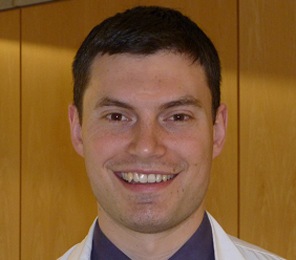Medicine from the heart . . . Noah Rosenberg
February 14, 2013
School of Medicine graduate and family medicine resident at the Barre Family Health Center, Noah Rosenberg, MD, has captured so many aspects of what all good clinicians should embrace within family and patient-centered care. He has taken the time to notice his surroundings and the surroundings of where his patient lives; he has empathized with the situation of his patient; he has offered practical, not textbook, care based on a person's real life situation; and, most importantly, he has met the patient where she is, literally offering to visit her home in the spur of the moment—a great act of altruism. These are high quality lessons.--Hugh Silk, MD
An unexpected home visit
 Wood smoke envelops the Barre Common, making it look and smell as I imagine it must have in the days before oil and antibiotics. My arms laden with local eggs, milk, produce and other groceries, I follow a patron of the Barre Food Pantry out to the street. As part of our family medicine & community health rotation, we are visiting various sites around town, lending a hand and learning about community resources. The Congregational church, in which the food pantry is housed, strikes an imposing figure behind us as the chilling air hits my face.
Wood smoke envelops the Barre Common, making it look and smell as I imagine it must have in the days before oil and antibiotics. My arms laden with local eggs, milk, produce and other groceries, I follow a patron of the Barre Food Pantry out to the street. As part of our family medicine & community health rotation, we are visiting various sites around town, lending a hand and learning about community resources. The Congregational church, in which the food pantry is housed, strikes an imposing figure behind us as the chilling air hits my face.
“So, which car is yours?” I ask, an overflow of shopping bags reminding me how little I’ve worked out over the past few months.
“Actually, I walked,” she answers.
A pregnant pause fills the space between us.
“From where?” one of my co-interns asks.
“You two don’t have to help; I can manage from here,” she contends.
“Of course you could, but please, let us help, we’d be happy to,” I implore. Volunteering at the food pantry is one of the most rewarding community projects we have the opportunity to participate in.
“Ok,” she says, already turning, and starting to walk.
I am immediately reminded of the lack of sidewalks in Barre, and the hurdle this presents to residents wishing to increase their level of physical activity. In unison, the three of us squeeze against the icy side of the road as cars pass.
“Do you read the Barre Gazette?” my fellow intern asks.
“Only when friends give me the newspaper—I can’t afford a subscription,” she answers.
“Well, when you get to, we’re going to be writing a monthly health column in the newspaper along with the other first-year residents at the Barre Family Health Center.”
She opens up. “Someone mentioned the health center to me, and I’ve been meaning to get a doctor, but I’ve just got so much going on right now. I’m in AA, and I’m doing the best at it that I can—I’ve been sober—but I have no money coming in now. That’s why I went down to the food pantry.”
“That’s exactly what it’s there for,” I say, reassuring her.
We climb the narrow, rickety steps up to her apartment. As she opens the front door and we step into her kitchen, the smell of cigarettes invades my nostrils. We leave her groceries on the counter, and sincerely thank her for letting us help.
On the walk back, my co-intern and I discuss the rightfully high price of cigarettes, and the possibility that if all those cigarettes are helping her stay sober, then maybe they’re actually helping her in the near-term. From walking along roadways without sidewalks, to visiting elderly people in homes with fall hazards around every corner, visiting someone in their home acquaints you with their environment and the many risks and compromises they often willfully or unintentionally take and make each day. This reminds me of one of the first principles of medical ethics: autonomy, and the responsibility that patients ultimately hold for making health care decisions. But it also reminds me that, all too often, people without means must take risks whether they choose to or not, risks just to put food on the table, and sometimes it becomes a physician’s job to help navigate them.